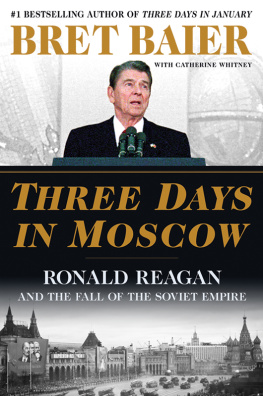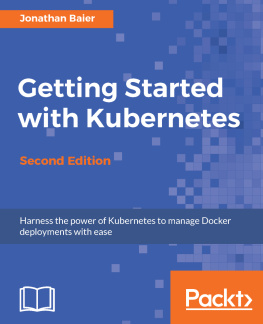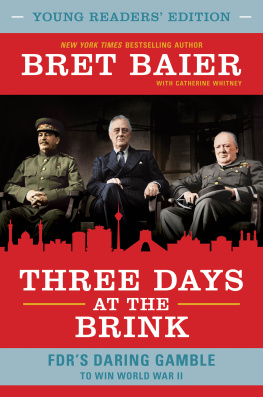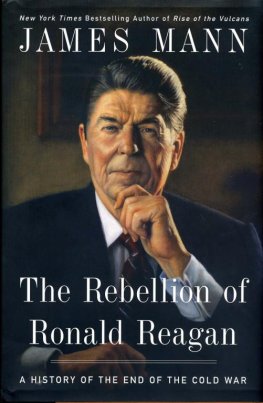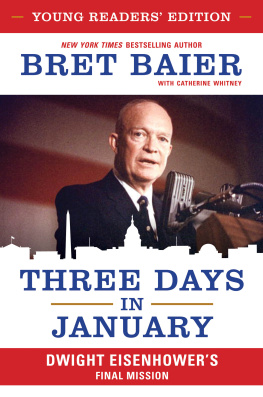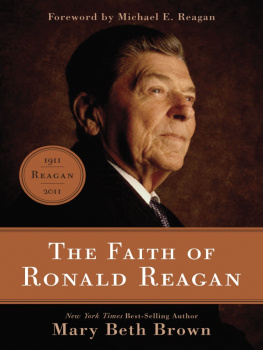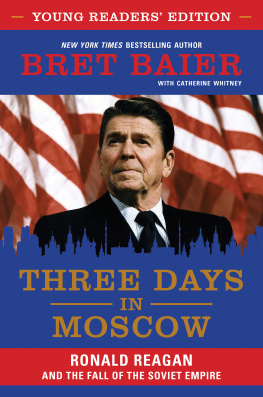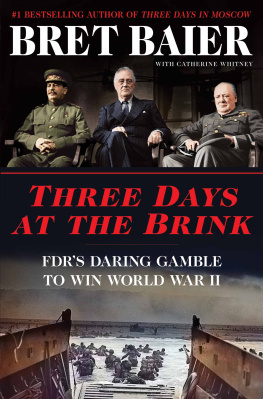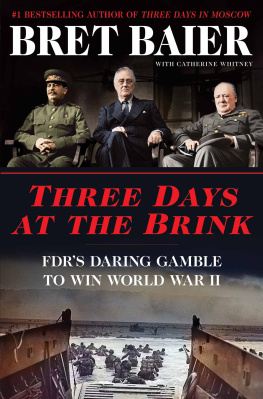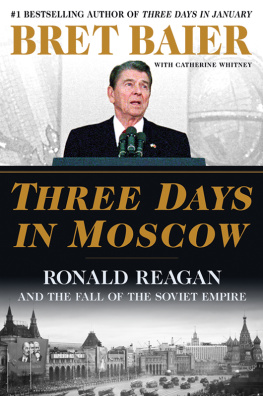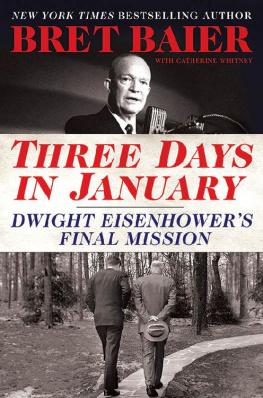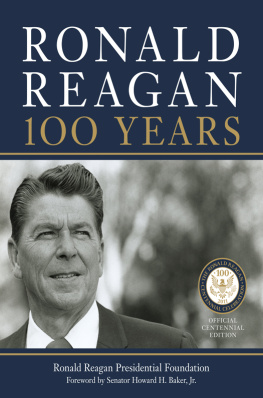Table of Contents
Landmarks
To my sons, Paul and Daniel, and their generation,
that they might inherit the legacy of
peace that Reagan envisioned
Contents
T he long, winding road up to the Ronald Reagan Presidential Library and Museum in Simi Valley, California, is lined with banners picturing US presidents from George Washington to Donald Trump. They flap in the breeze, historical markers and patriotic flagsa reminder that the presidency is not about one man alone. As I exited my car at the top of the hill and walked toward the entrance, the hot sun beating on my back, I passed the tall bronze statue of our fortieth president at the entrance, making sure I touched Reagans outstretched hand, which is clearly worn on the palm by the thousands of visitors every day who make the same movea presidential high five.
That day I was on a mission. With my fantastic coauthor, Catherine Whitney, and amazing researcher, Sydney Soderberg, both of whom I truly loved working with on the Dwight D. Eisenhower book, I was in search of the next focus, the next moment in presidential history that needed reexamination, the next speech that might have changed the world but that very few people at the time or since seemed to grasp the importance ofnot to mention the very real prospect that a new generation might be reading about this president in an intimate way, or in any way, for the first time.
It was an equation that seemed to work well with Three Days in January , which focused on President Eisenhowers farewell address, delivered three days before John F. Kennedys inaugural address, then bounced back to Eisenhowers life to show how he arrived at the convictions and the specific messages he expressed in that legendary eighteen-minute farewell speech from the Oval Office.
With Reagan, my interest settled on a speech near the end of his second term in office, in late May 1988, on a momentous trip to Moscow, the capital of the Soviet Union. The purpose of that visit was to hold a fourth summit between Reagan and General Secretary Mikhail Gorbachev. A lot happened on that now largely forgotten trip, but my attention was especially captured by the speech Reagan gave at Moscow State University.
I made my way back to the library, passed the entrance to the museum, and entered a room with familiar large wooden tables, similar to the setup at the Dwight D. Eisenhower Presidential Library in Abilene, Kansas. I pulled up a chair next to the gray cardboard box on the corner of the table. I flipped it open and thumbed through the contents. The folder I pulled out contained several drafts and a printout of the complete speech, along with a transcript of the question-and-answer session with Moscow State University students. I read through it but didnt truly appreciate the genius of the speech and the Q&A until I heard President Reagan deliver it. Ten steps away, I put on headphones at another table and listened to the address delivered that day. I was struck by the complete absence of rancorno veiled threats, no chest-thumping, no insultsonly a hopeful message directed at young students just starting out. Reagan was funny, optimistic, and warm in a grandfatherly way. He expressed awe at all the wonders that awaited the young studentsthe one catch being that freedom was a prerequisite. He seemed to relish the moment, which had been a lifetime in the makingfrom anti-Communist activist to president touring Red Square and speaking to Soviet students.
Most experts believe the fourth summit between Reagan and Gorbachev was essentially just the final turn and dip in a long diplomatic dance over Reagans two terms. But looking at the text of the speech that day in Simi Valley, hearing it on audio, and eventually seeing it on video, it seemed to me to be much more than that.
President Reagan spoke to the college students in Moscow under a giant image of Vladimir Lenin, with confidence, optimism, self-assuredness, pride in his country, and knowledge that the Soviet Unions days were numbered, telling the students at one point, I want to talk not just of the realities of today but of the possibilities of tomorrow.
And then, in the heart of Communist thoughtthe capital of communismPresident Reagan delivered these words about freedom, not in a threatening or scolding way but in a shining city on a hill, hopeful manner:
Freedom is the right to question and change the established way of doing things. It is the continuing revolution of the marketplace. It is the understanding that allows us to recognize shortcomings and seek solutions. It is the right to put forth an idea, scoffed at by the experts, and watch it catch fire among the people. It is the right to dreamto follow your dream or stick to your conscience, even if youre the only one in a sea of doubters. Freedom is the recognition that no single person, no single authority or government has a monopoly on the truth, but that every individual life is infinitely precious, that every one of us put on this world has been put there for a reason and has something to offer.
The speech can still evoke a thrill. It was an audacious challenge by a US president to a Soviet citizenry rocked by economic crisis and international conflicts. The speech sounded to many listeners like a siren call, an invitation to follow a different dream.
Looking at the words of the speech and then hearing and seeing them delivered was powerful for me. I was intrigued to learn how a relentless enemy of communism had helped orchestrate such a dramatic finale to an adversary hed once called the Evil Empire, without firing a shot. What was in his character and temperament that allowed him to collaborate with Gorbachev in a strategy of peace through strength? How did he stand firm on an opposing set of principles and still negotiate? He found a way. What is the measure of a man who could so completely capture the imagination of both the nation and the world?
UNLIKE THE EISENHOWER PRESIDENCY, which was before my time, I did have some sense of President Reagans two terms in office growing up. And it so happened I was in the Rose Garden with President Reagan just months before the Moscow summit.
Im forty-seven, and in the fall of 1987, I was a senior in high school and the student council president at Marist School in Atlanta. With that position came the honor of representing Marist in Washington, DC, to accept a national excellence award on behalf of the school. So I traveled with Marist headmaster Father Joel Konzen to Washington for a ceremony at the White House.
I distinctly remember being struck by awe walking into the Rose Garden for the eventthe sun shining, the White House gleaming, the garden manicured, the chairs lined up, the podium positioned. I can still see the White House press corps crowding into the back of the Rose Garden, a mass of television cameras, photographers, and reporters with notebooks milling around, waiting for the president to arrive.
President Reagan walked out of the Oval Office with his education secretary, William Bennett. Both men talked about the importance of education and of supporting schools that were succeeding, taking time to name and praise the schools being recognized for excellence that day, their student and faculty leaders all in attendance. When he was finished, Reagan started to walk back to the Oval Office, and ABC White House correspondent Sam Donaldson yelled out a question: Mr. President, what is your reaction to the Bork nomination possibly dying in committee? (Supreme Court nominee Robert Borks nomination was on the rocks at the time, and it was the story of the day in Washington.) Reagan ignored the reporters shouting at first but then turned and said, Over my dead body, before going inside. The next day, Borks nomination was rejected by the Senate Judiciary Committee by a 95 vote. But Bork didnt back down and the administration didnt pull the nomination, despite quickly dwindling political support. Two weeks later, the full Senate voted against Borks confirmation 5842. It was big news.

